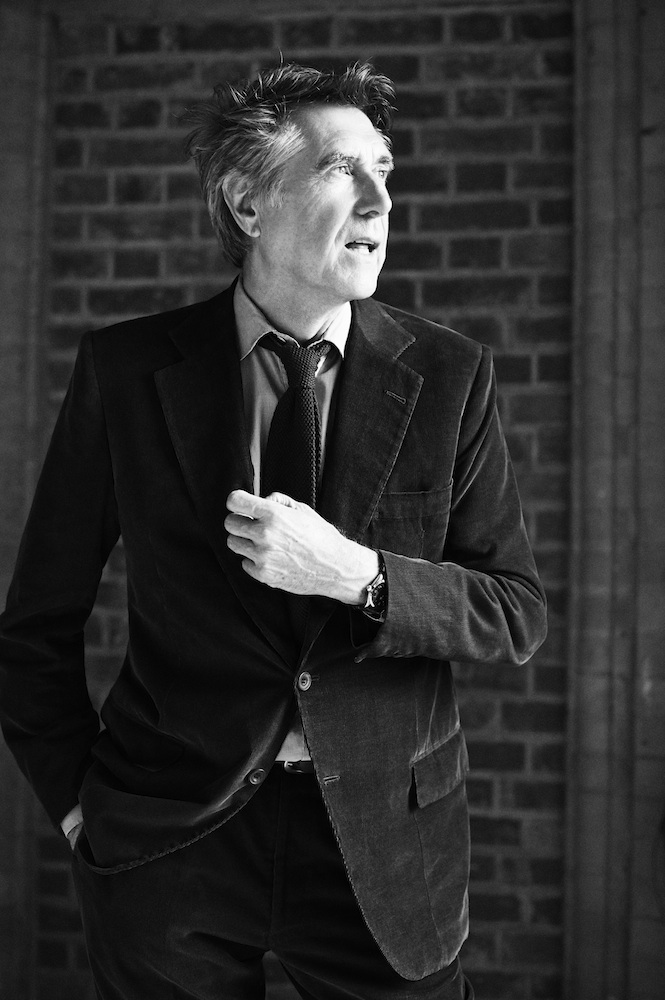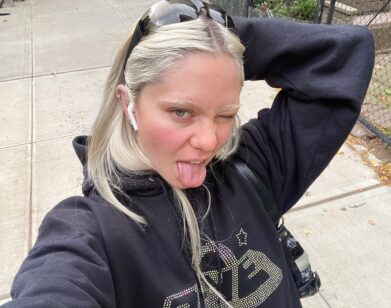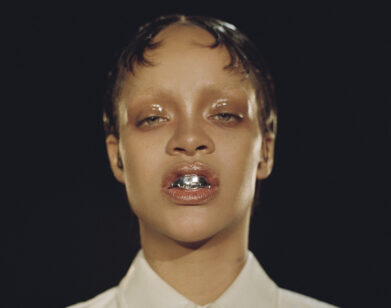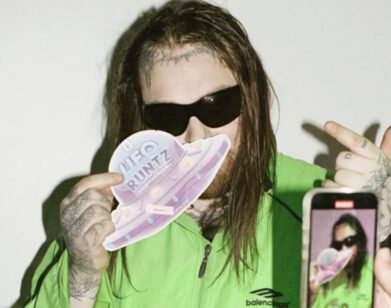Bryan Ferry’s Live Act

ABOVE: BRYAN FERRY. PHOTO COURTESY OF SIMON EMMETT.
Bryan Ferry is getting over a cold. Days after he had to cancel a show in Boston he’s sipping a small water bottle in his room high up the Mandarin Oriental Hotel overlooking Columbus Circle.
Best known for his work as the founding member of art-rock group Roxy Music, Ferry has a new album, Avonmore, out today and he’s just wrapped his U.S. tour. Avonmore is his first original work in four years and features collaborations by Norwegian DJ Todd Terje, legendary disco guitarist Nile Rodgers, and Johnny Marr of The Smiths. The music is of a piece with his Roxy Music work: stylish and lush, but without some of the aggressive edge of those early recordings. It’s self-assured, danceable in a way, and has some ineffable quality of the avant garde.
Ferry speaks slowly and carefully in a posh accent. Because this is a requirement of Bryan Ferry profile writing, he wears a royal blue cashmere sweater and tan corduroys. His hair, as always, is a perfect series of sweeping gray waves. We discussed great concert venues, working with his sons, and why London is the center of the universe.
MICHAEL HAFFORD: So what have you been doing in New York? Just press?
BRYAN FERRY: Today’s actually the first day of doing that. I did the show at the Beacon Theater. That went really well. I haven’t really been out much. I had a bad cold.
HAFFORD: Do you feel better now?
FERRY: Yeah, thank you. We had to cancel the show in Boston, which was a drag.
HAFFORD: That sucks.
FERRY: The shows we did do went really well.
HAFFORD: What makes a successful live show for you?
FERRY: If the audience loves it is a start. If the band plays well. And if the audience is responsive, the band tends to play better. It’s a two-way thing.
HAFFORD: Is that something you can tell right away?
FERRY: Sometimes you can tell right away. Other times you get about halfway through and you’re saying, “Hmm, what do they think of this?” And then you suddenly realize that they’re loving it. They’re being kind of quiet but they’re listening to every detail. It’s surprising how different each audience can be in the way they react. If you have a long career, it usually ends up with them loving the show. That’s why they’re there to see you. Touring at the moment has been really good, with this band.
HAFFORD: Is there a certain city that you prefer to play? Do you prefer a New York crowd to a London crowd?
FERRY: Oh, yeah. I do [prefer New York], although we played London last year and that was great. Sometimes it’s down to the venue—what the venue’s like rather than the city. I tend to like old theaters that have some kind of personality about them. The Beacon is like that here. In London we did the Royal Albert Hall, which is a wonderful old place as well. We played in Vienna last year in the Vienna Opera House and that was pretty amazing. A really beautiful, proper theater—boxes and stuff. Really good.
HAFFORD: Do you feel that when you’re in an institutional-type building you have to play up to it in a way?
FERRY: Kind of. You feel like you owe it to the building. All these great conductors or orchestras have played in here. The other day I was playing in Toronto and it suddenly occurred to me, I have an album of Charlie Parker playing at the Massey Hall and he must have stood exactly here on the stage. I thought, “Wow, how cool.” I’d love to go play at the Apollo sometime.
HAFFORD: You gave an interview in the early ’90s after a long, torturous recording process for one of your albums. You had stopped playing live. Do you feel that since you play live you’re now like, “I can do this”?
FERRY: In the early days I wasn’t crazy about performing. I always liked recording, but being on stage, I had mixed feelings about it. It’s funny as you get older, it’s exactly as you say, “I can do this. I just have to try and be me as best as I can on a given night.” It’s good having a lot of different songs to choose from to do the show. It means you don’t get bored of doing it in one particular genre. There’s quite a lot of variety in the set that we do; it keeps it interesting.
HAFFORD: So you play one set for each tour?
FERRY: Yeah, one set per tour. If you change it the lighting and the sound people go sort of crazy. They’ve got settings for each thing. The band has to change guitars. You want to try to make it fairly smooth. You do try to change a little bit, but you try and minimize that. I think we worked out a pretty good show this time. There are two new songs and some early Roxy things–everything. Sometimes it’s hard to find a band that can play all the different periods, the different styles of stuff that I’ve done. But this band has been really good at learning stuff. And they’re young, so they’re keen to, “Oh, yeah try that one,” you know. It’s good to have that kind of energy and enthusiasm. We’ve got four girls in the band and they’re usually hardworking. They learn stuff. [looks out the window] It’s interesting to see these helicopters hovering around. I wonder what they’re looking for.
HAFFORD: I guess in a few years, the sky will be full of drones.
FERRY: Yeah, I guess so. [laughs]
HAFFORD: Dropping off our Amazon packages and—
FERRY: Interviewing us.
HAFFORD: Your job will be a lot easier. You can stand at the window and declaim like the Pope.
FERRY: [laughs] Exactly.
HAFFORD: Is there any period of your career you wish you could go back to? Or is this the best it’s ever been?
FERRY: You hope it is. You try and convince yourself it is. It’s terrible if you think of something being better. But no, there are certainly good memories from different times in my life. I am enjoying life at the moment. It’s a very good time to be living in London.
HAFFORD: Why’s that?
FERRY: It’s very much an art center now. Next week is the big Frieze week. It’s not as provincial as it was before—there are really good restaurants now. It may not seem that important, but it’s reflective of how much it’s improved, I suppose, as a city. It’s the center of the world. Probably in the same sense that New York was in the late ’70s. It really was the place to be. Although coming back this time, I wish I could be here longer. Hopefully we’re going to come back in the spring and do some more things. I will be back. But I felt very much at home this visit, which is interesting. One of my sons just moved here as well.
HAFFORD: What’s he doing here?
FERRY: He’s a DJ. He does DJing and he remixes and stuff like that.
HAFFORD: Would you ever collaborate with one of your sons?
FERRY: Oh, yeah. I have done that. He organizes any of the dance records, when you get people to remix tracks. This guy Todd Terje did a couple of tracks. We did a track together on the album. He’s very, very good. He’s a friend of my son. He’s very much in that orbit. My other son plays drums on the new album.
HAFFORD: It’s like the Ferry family business almost.
FERRY: Well, kind of. They dip in and out of it. They have their own worlds, luckily, as well.
HAFFORD: You have to have that.
FERRY: Otherwise it would get too crazy, I think.
HAFFORD: When you’re seeking out art or music, do you find yourself consciously looking for things to consume or are they brought to you?
FERRY: Well, no. They’re not brought to me. I guess in the same way that you read stuff in the paper.
HAFFORD: Do you interact with social media at all?
FERRY: No. I wouldn’t know how to do it. I do have a computer. It must seem weird to you. I have friends who are artists and dealers. I hear of some things. I have a friend who’s an art critic. I like to plough my own furrow, really. When I go to festivals and stuff like that, you hear stuff. I did Coachella in the spring. We did Glastonbury this year also. It seeps into your consciousness.
AVONMORE IS OUT TODAY, NOVEMBER 17. FOR MORE ON BRYAN FERRY, VISIT HIS WEBSITE.






